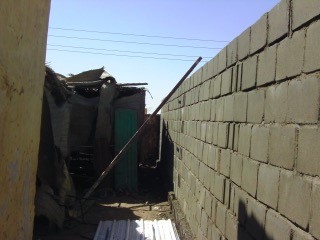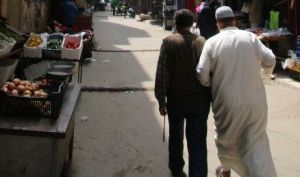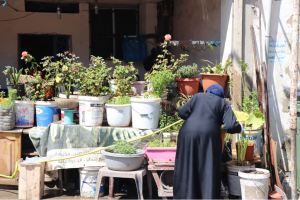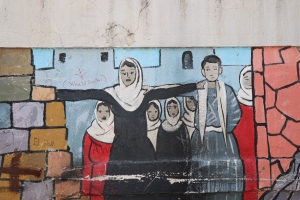What is the value of the North-South distinction when discussing ‘humanitarian’ responses to forced displacement? In this blog, Louise Olliff draws on her ethnographic fieldwork in Australia, Thailand, Indonesia and Geneva and her interviews with refugee diaspora organisations (RDOs) to explore how this distinction makes it possible to trace the significance of power and inequality in humanitarian response. Olliff first describes how refugees settled in Australia have established small voluntary organisations to assist ‘their people’ displaced globally, as part of what Fiddian-Qasmiyeh conceptualises as ‘refugee-refugee humanitarianism.’ However, these small organisations are made invisible and are excluded and delegitimised by mainstream, dominant Northern humanitarian actors, often leading RDOs to self-identify as ‘Southern’ actors.
Additionally, Olliff explores how RDOs are perceived by the displaced people they assist, who often view RDOs as better resourced and more powerful than themselves, and, therefore, as more aligned with, or identifiable as, ‘Northern’ actors. Olliff’s insights contribute to the Southern Responses to Displacement project’s aims of identifying and critically examining ‘Southern’ responses to displacement, understanding the ‘motivations, nature and impacts of Southern-led initiatives’, and centralising displaced people’s perceptions of Southern-led initiatives. While the South-North binary is a problematic one in many regards (as we are exploring throughout the Southern Responses to Displacement project), importantly Olliff argues that in making positions of power and inequality visible, it is possible to take action to shift relations and processes of exclusion and redress the imbalance in access to resources and in the value placed on all humanitarian response. In so doing, more effective ‘tapestries of care’ can be facilitated through multi-scalar and more collaborative modes of humanitarian response.
This blog was posted on 3rd July 2019
If you find this piece of interest please see our Thinking through the Global South series or visit our recommended reading at the end of this post.
Refugee diaspora humanitarianism and the value of North/South distinctions in research on responses to forced displacement
by Louise Olliff, University of Melbourne
In 2015, I met an Iraqi-Australian man, Haider, who told me a story of how he came to leave Iraq in the 1990s and ended up in a refugee camp in Saudi Arabia. In this telling, Haider evoked the horror of forced displacement—of walking for days and surviving on unfinished meals that were left behind by US military personnel, of not having enough water to drink, of confusion and fear, and of crossing the border to a barren landscape where ‘they put a fence around us.’ He also told how, when they first arrived, he and his brother decided to walk back each day the way they had come carrying bottles of water to give to those who were struggling behind. As he told this story, sitting in a suburban café in Melbourne, Australia, Haider leaned forward and put both hands on the table; tears came to his eyes and his voice wavered.
This story was told in response to a question I asked about why Haider had been involved in voluntary organisations helping refugees and people seeking asylum for such a long time, both in Australia and internationally. (Indeed, Haider had a whole chapter written about his significant voluntary work in a book titled Unsung Heroes.) Haider tried to explain that his ‘need to help’ (Malkki 2015) came from his own lived experience of displacement; that it started when he picked up those water bottles and walked back the way he came, and that this is what distinguished ‘people like him’ from ‘professional’ humanitarians. In Haider’s words:
‘The people who go there [to help refugees from Iraq], they have no idea how we suffer. Whatever they have–even if it’s sympathy–it’s not the same’.
Such a narrative corroborates much of what is emerging in literature on what Fiddian-Qasmiyeh refers to as refugee-refugee humanitarianism and on local communities as the ‘first and last providers of protection’ (see FMR 53). That people who are the most proximate (both physically, culturally and experientially) are those who are obliged, compelled or asked to help others in times of need should not be revelatory. That there is comparatively little written about local/refugee actors in situations of forced displacement is, for me, a more significant revelation. While the critical humanitarianism literature provides important and valuable insights into dominant (Northern) actors—into the genealogy and effects of the ‘international humanitarian order’ (Barnett 2011)—there is still much work to be done to critically examine other (Southern) humanitarianisms.
However, what Haider’s narrative does not make clear—and something which I grappled to make sense of in my own doctoral research—is how ‘refugee diaspora’ (Van Hear 2006) responses to displacement should be considered within this schema of local/international, Northern/Southern, refugee/non-refugee. How useful are these distinctions when writing about responses to forced displacement that come from refugee diaspora communities living in Australia?
But first, a little about this research. Through ethnographic fieldwork in Australia, Thailand, Indonesia and Geneva and interviews with representatives of 26 refugee diaspora organisations (RDOs), my research shows how refugees resettled to Australia from diverse backgrounds commonly establish small voluntary organisations and mobilise resources to assist ‘their people’ living in displacement contexts in other parts of the world. RDOs undertake a range of activities: they raise money for schools and health centres, purchase wheelchairs and water pumps, send material aid and collective remittances, facilitate migration outcomes, and undertake systemic advocacy. They also help in ways that are non-quantifiable: strengthening social networks of care, bearing witness and offering hope. I argue that the capacity of resettled refugees to draw on transnational social networks, contextual knowledge of humanitarian situations, mobility enabled through resettlement, and (in)visibility in different contexts, makes them distinct humanitarian actors.
Yet even as my research sought to contribute to (critical) literature on ‘other’ humanitarianisms it does not sit as neatly into the narrative of ‘Southern responses.’ This may be because, like the Southern Responses to Displacement project well describes, what constitutes a Southern/Northern actor in responses to displacement is not entirely clear. If the concept of ‘the South’ equates to perspectives that are excluded, marginalised, dominated or made invisible, then there is something to be said about RDOs as Southern actors. They are, for example, excluded by the dominant (Northern) humanitarian system from its coordination mechanisms, funding, access to decision-makers, and so on. There are also processes of de-legitimisation of RDOs as actors (see Hilhorst and Jansen on legitimisation in the humanitarian arena) because they do not fit within a (Northern) understanding of what constitutes ‘humanitarianism.’ For some humanitarian professionals interviewed for my research, RDOs are too small to be significant, too informal or unprofessional, and, more pointedly, they are politically-motivated, exclusionary or biased because of their alignment with ‘a people’ and not with an idea of ‘humanity’ in its impartial abstraction. By ‘othering’ refugee diaspora humanitarianism, we can argue that RDOs fall into the domain of Southern responses.
At the same time, I am cognisant that the people who are the recipients of RDO acts of helping (whether we call it ‘humanitarianism’ or not) may see the power and privilege of these actors from a very different perspective. This was evident in a conversation I had with a small group of refugees involved in community-based organisations in one of the camps on the Thai-Burma border. I had travelled to the camp to try to understand refugee diaspora humanitarianism from the perspective of the ‘beneficiaries’ of RDO activities. In this case, an RDO in Australia had fundraised AUD $67,000 and sent this as cash to be distributed to households in the aftermath of a fire that destroyed many homes. When I asked those from the camp about this act, their response was lukewarm. That this RDO had sent money ‘was good’ but, for them, it ‘was not enough.’ They wanted their ‘brothers and sisters’ in Australia to help in other ways—not by sending money, but by coming back to the camp to transfer the skills and knowledge that they had acquired through studying and working in Australia. They spoke about those in the wider diaspora not doing as much as they could to help them, now that they were in a rich and lucky country.
This sentiment was echoed in other conversations I had in very different contexts: with a South Sudanese humanitarian professional who spoke of his ‘disappointment’ at how the diaspora were contributing to their homeland, with Oromo asylum seekers living in dire conditions in Indonesia, and among Afghan women in Iran. The awareness of the relative power and privileges of people in the wider diaspora among those living in precarious displacement contexts, while problematic in many ways, gives me reason to pause in framing refugee diaspora humanitarianism as ‘Southern.’
Indeed, the idea of ‘Northern’ or ‘Southern’ requires a binary that has the potential to shift depending on what question you are asking or what context you are commenting on. In this way, refugee diaspora humanitarians can simultaneously exist as both Southern and Northern actors. To return to Haider, he used his own past experiences and diasporic identity to distinguish himself from humanitarian professionals; to frame himself as a ‘Southern’ actor. But Haider also used his power to act—which came from such privileges as his Australian passport, his ability to mobilise resources in a wealthy and safe place, as well as his gender and English proficiency—in ways that his compatriots in Iraq or Saudi Arabia could not. While Haider included himself in the circle of suffering when he claimed that ‘they have no idea how we suffer,’ the contexts in which Haider and Iraqis displaced in Turkey, for example, were ‘suffering’ are obviously vastly different. Depending on where you position Haider and the Iraqi diaspora organisations he was affiliated with, Haider’s positionality as a Southern/Northern actor shifts.
If it is so malleable, what then is the value of Northern/Southern distinctions when talking about responses to forced displacement? For me, the value is in its potential to make visible dimensions of power in responses to forced displacement with, importantly, a view to shifting these relationships. As an activist-researcher, drawing on the idea of RDOs as Southern actors, for example, enables light to be cast on the processes that exclude smaller, less powerful actors and their distinct capabilities from access to humanitarian spaces, resources, decision-making and the legitimacy to act. As an activist-researcher, drawing on the idea of RDOs as Southern actors based in the global North also recognises processes of marginalisation, exclusion and domination that refugees and people seeking asylum face in a settler-colonial context like Australia, with its ugly relationship to migration and race, and tries to shift public discourse that casts refugees as either passive victims to be helped or potential threat.
In the context of immense human suffering caused by forced displacement and the gross inadequacy of responses to forced displacement, deploying the idea of Southern/Northern actors is useful if it creates spaces for a much more inclusive idea of what constitutes ‘humanitarianism,’ recognising that no actor—each having complex motivations, modalities and capacities to act—is going to have all the answers. Indeed, what is really needed in responses to forced displacement are much stronger ‘tapestries of care’ where the diverse threads of different actors and actions are interwoven—some thick and strong and machine-made (the influx of international agencies in crisis), some fine, dense and hand-spun (families and communities, both local and transnational), some a little misshapen, sporadic but persistent (RDOs). Perhaps the idea of mending the holes in a colourful and imperfect fabric of care in situations of forced displacement is where we can productively evoke the imagery of North/South lines.
**
If you have found this piece of interest read and contribute to our Thinking through the Global South series, and read the following pieces:
Carpi, E. (2019) Thinking Power Relations across Humanitarian Geographies: Southism as a Mode of Analysis
Carpi E. (2018) ‘Southern’ and ‘Northern’ assistance provision beyond the grand narratives: Views from Lebanese and Syrian providers in Lebanon
Fiddian-Qasmiyeh, E. (2018) Thinking through ‘the global South’ and ‘Southern-responses to displacement’: An introduction
Fiddian-Qasmiyeh, E. (2019) Exploring refugees’ conceptualisations of Southern-led humanitarianism
Fiddian-Qamsiyeh, E. (2018) Refugee-Refugee Humanitarianism
Fiddian-Qasmiyeh, E. and Daley, P. (2018) Conceptualising the global South and South–South encounters
Featured image: RDOs raise small amounts of money for small projects, like constructing a boundary wall at a refugee community-run school in Kassala, Sudan, funded by donations largely from the Eritrean diaspora in Melbourne. (c) Eritrean Australian Humanitarian Aid



